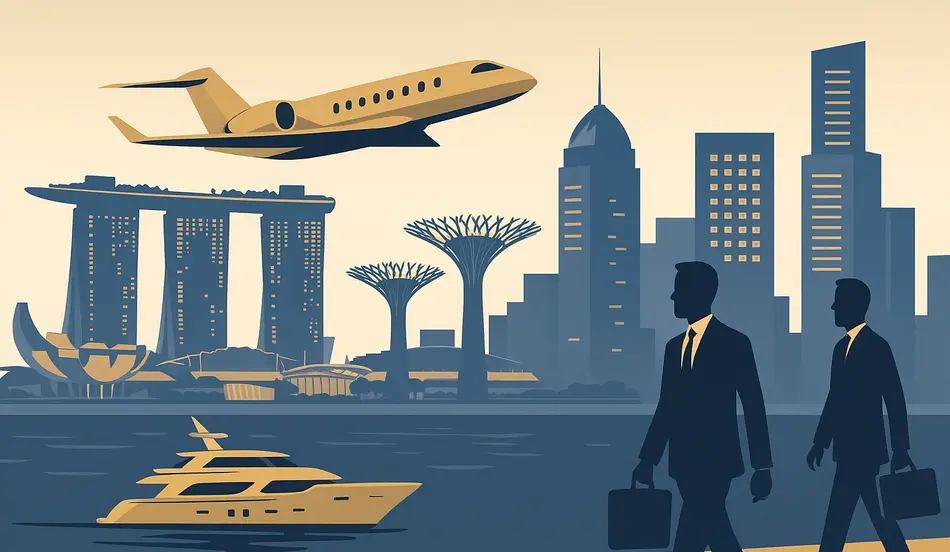Billionaires are quietly immigrating to Singapore in an unprecedented wave that’s fundamentally reshaping the city-state’s economic and social landscape. While the rest of the world grapples with anti-immigration sentiment and protests, Singapore is experiencing the opposite phenomenon – a flood of ultra-wealthy individuals seeking refuge in what has become the world’s most attractive tax haven and financial safe haven.
The numbers are staggering. In 2024 alone, approximately 47 billionaires and more than 3,400 millionaires moved to Singapore, bringing with them an estimated $150 billion in wealth. For a city-state of just 5.9 million people, this represents an economic tsunami equivalent to almost one-third of Singapore’s entire GDP arriving in a single year.
This isn’t a new phenomenon, but it has accelerated dramatically in recent years. Since 2009, when Facebook co-founder Eduardo Saverin renounced his US citizenship to make Singapore his permanent home, the city-state has become the destination of choice for the world’s wealthiest individuals. Today, Singapore is home to 49 billionaires out of roughly 3,000 worldwide, and over 240,000 millionaires – a concentration of wealth that’s 22 times higher than its share of the world’s population.
The migration represents a fundamental shift in global wealth patterns, with Singapore emerging as the new financial capital of Asia, surpassing traditional hubs like Hong Kong and rivaling Switzerland as the world’s premier wealth management destination. But this transformation comes with significant costs and challenges that are reshaping Singaporean society in ways that may be irreversible.
The Family Office Revolution: Singapore’s Wealth Magnet
The primary mechanism driving this billionaire migration is Singapore’s Global Investor Program, which offers three pathways to permanent residency for the ultra-wealthy. The most popular option has become the family office route, requiring a minimum investment of $150 million US dollars in assets under management, with at least $37 million actively deployed into qualifying investments.
Family offices represent a revolutionary approach to wealth management that has made Singapore the top global hub for private wealth management, surpassing even Hong Kong and rivaling Switzerland. These private investment firms work exclusively for single families, providing complete privacy, tax advantages, and professional management of generational wealth.
The appeal of family offices lies in their unique combination of privacy and tax efficiency. Unlike hedge funds or venture capital firms, family offices don’t have to disclose performance publicly since they only manage their own money. Singapore’s government has made them even more attractive with tax exemptions, as long as the family office hires locals and reinvests domestically.
This has created a sophisticated ecosystem of wealth management professionals, from former bankers and lawyers to hedge fund investors, all working to preserve and grow family fortunes across generations. The separate legal entities don’t even need to carry the family’s name, making them virtually invisible to public scrutiny.
The family office boom has transformed Singapore’s financial sector, which now manages over six trillion Singaporean dollars in assets and has created tens of thousands of jobs for locals, from entry-level analysts to senior portfolio managers. Singapore has become the undisputed wealth management capital of Asia.
Why Singapore? The Perfect Storm of Advantages
Singapore’s appeal to billionaires goes far beyond tax advantages, representing a carefully crafted combination of political stability, legal transparency, and strategic positioning that makes it uniquely attractive to the world’s wealthiest individuals.
Political stability is perhaps Singapore’s greatest asset. Since independence in 1965, the country has been governed by the same party, the People’s Action Party, founded by the legendary Lee Kuan Yew. Political protests are rare, elections are orderly, and the government famously plans policies decades in advance. For billionaires, this kind of long-term stability and predictability is invaluable.
The legal and regulatory environment is equally compelling. Singapore consistently ranks in the global top five for transparency and corruption-free governance, tied with countries like Denmark and Finland and ahead of the US and UK. The Corrupt Practices Investigation Bureau has the power to arrest anyone, including tycoons, officials, and even ministers, with severe penalties including mandatory jail time and career destruction.
Language and safety also play crucial roles. English is Singapore’s official working language, written into law and used in courts and business. The country routinely ranks in the global top three for personal safety, with violent crimes rare and harsh penalties for serious offenses.
The financial advantages are equally compelling. Singapore has no capital gains tax, meaning every cent of profit from stock sales, property transactions, or company sales stays with the seller. There’s no inheritance or estate tax either, allowing families to pass down dynasties worth billions without losing nearly half to the government, as they would in the US or Europe.
Corporate tax is capped at a flat 17%, one of the lowest among developed economies, with government incentives in finance, tech, and green industries making the effective rate even lower. The message is clear: Singapore isn’t just a safe place to live – it’s the most tax-efficient vault in the world for family wealth.
Singapore: A Global Wealth Hub
With no capital gains, inheritance, or estate taxes — and one of the lowest corporate tax rates globally — Singapore is the most tax-efficient vault for family wealth. Employers in finance, tech, and green industries can capitalize on this by attracting world-class talent. Post your job on WhatJobs today and connect with professionals ready to thrive in Singapore’s dynamic economy.
Post a Job Free for 30 Days →The Hong Kong Exodus: A Catalyst for Change
The dramatic shift in Singapore’s fortunes can be traced directly to the political upheaval in Hong Kong, which was previously the undisputed financial hub of Asia. The 2019 mass protests and Beijing’s response, including the sweeping imposition of the National Security Law in 2020, fundamentally transformed Hong Kong’s political and legal landscape.
The National Security Law criminalized broadly defined acts like subversion, secession, terrorism, and collusion with foreign forces, giving authorities sweeping powers to freeze assets or detain people for vaguely worded offenses. For business elites, this was especially chilling, as even routine business with Western partners could suddenly draw unwanted attention.
The case of Xiao Jianhua, known as the “banker to the princelings,” exemplified the new reality. In 2017, Xiao was literally abducted from his room at the Four Seasons Hotel in Hong Kong and taken back to the mainland. After years of uncertainty, Beijing announced in 2022 that he had been sentenced to 13 years for bribery and stock manipulation.
The message was clear: if someone with Xiao’s wealth and political connections could vanish, no billionaire was truly safe. This coincided with Beijing’s sweeping campaign against its own billionaire class, particularly in the tech industry, with Jack Ma’s Ant Group IPO being abruptly pulled and other tech giants facing massive antitrust investigations and fines.
The result was a mass exodus of Chinese and Hong Kong billionaires, with nearly 10,000 high net worth individuals leaving China in 2022 alone, according to Henley and Partners. Singapore, being nearby, politically neutral, and above all safe, became the natural destination.
The Economic Impact: Boom and Inequality
The influx of billionaire wealth has created an unprecedented economic boom in Singapore, but it has also exposed deep social and economic tensions that threaten the country’s social cohesion and national identity.
On the positive side, the financial sector now manages over six trillion Singaporean dollars in assets, creating tens of thousands of jobs for locals and establishing Singapore as Asia’s wealth management capital. Tax revenue has surged through VAT on luxury spending, property taxes on expensive real estate, and corporate taxes from new businesses.
Billionaires are also investing heavily in Singapore’s startup ecosystem, funding local tech companies and helping the country transition to a knowledge-based economy. The economic benefits are undeniable and have contributed to Singapore’s continued prosperity.
However, the social costs are becoming increasingly apparent. Housing costs have skyrocketed, with even public housing (HDB flats) reaching record highs. In 2022, over 400 public flats sold for more than a million Singaporean dollars – a phenomenon that was once rare but has become almost routine.
The ripple effects extend throughout the economy. Singapore was ranked the world’s most expensive city in 2023, with groceries, transport, and dining out all becoming significantly more expensive. Real wage growth for ordinary workers was just 0.4% in 2023 while costs kept rising, creating a real squeeze for middle-class Singaporeans.
The result is stark inequality that’s becoming impossible to ignore. Singapore now has the worst wealth inequality in all of Asia Pacific, with the top 10% of households controlling two-thirds of the country’s wealth. While Singapore has over 240,000 millionaires, about 800,000 adults have less than $13,500 in total net worth.
The Inequality Challenge in Singapore
With living costs soaring and wealth inequality widening, middle-class workers face growing financial pressure. Employers can play a vital role by offering fair opportunities that support upward mobility and economic balance. Post your job on WhatJobs today and connect with candidates eager for stability and growth in uncertain times.
Post a Job Free for 30 Days →A Real-World Example: The Family Office Executive’s Journey
David Chen, a former investment banker who now runs a family office for a Chinese billionaire in Singapore, shares his experience of the wealth migration phenomenon. “When my client decided to move his family and business operations from Hong Kong to Singapore in 2021, it wasn’t just about taxes,” he explains. “It was about security and predictability for his family’s future.”
David’s client, who made his fortune in real estate development, was increasingly concerned about the political situation in Hong Kong and mainland China. “The National Security Law changed everything,” David says. “Suddenly, even routine business decisions could be interpreted as political statements. My client wanted a safe haven where he could focus on business without worrying about political implications.”
The family office setup in Singapore provided exactly what they needed. “We have complete privacy in our operations,” David explains. “The family’s name isn’t even on the legal entity, and we don’t have to disclose performance like hedge funds do. We can focus on long-term wealth preservation without public scrutiny.”
The tax advantages were significant but not the primary motivation. “The zero capital gains tax is nice, but the real benefit is the stability,” David says. “My client knows that Singapore’s tax laws won’t change suddenly, and his family’s wealth will be protected for future generations.”
However, David acknowledges the social impact of the wealth migration. “I can see how this is affecting ordinary Singaporeans,” he says. “Housing prices have gone through the roof, and there’s definitely a sense that the country is becoming more expensive for regular people.”
David’s advice to other wealthy families considering Singapore reflects the lessons he’s learned. “Don’t just focus on the tax benefits,” he says. “Consider the political stability, the legal system, and the long-term security for your family. Singapore offers something that’s increasingly rare in today’s world – predictability.”
David’s story demonstrates that while the billionaire migration brings significant economic benefits, it also creates challenges that require careful management to ensure that Singapore remains a place where both the ultra-wealthy and ordinary citizens can thrive.
Don’t Miss the Global Wealth Migration Wave
The billionaire migration to Singapore represents a fundamental shift in how global wealth is distributed and managed. For investors, entrepreneurs, and professionals, understanding this trend is crucial for positioning themselves in an increasingly globalized economy.
The key to success in this new environment is to recognize that wealth is becoming more mobile and that countries are competing for global capital. This creates both opportunities and challenges that require strategic thinking and careful planning.
For those considering international expansion or investment, Singapore’s success offers valuable lessons about what makes a location attractive to global wealth. Political stability, legal transparency, and strategic positioning are more important than ever in today’s uncertain world.
The future will likely see more countries competing for global wealth, making it essential to understand the factors that drive these decisions and how they affect local economies and societies.




